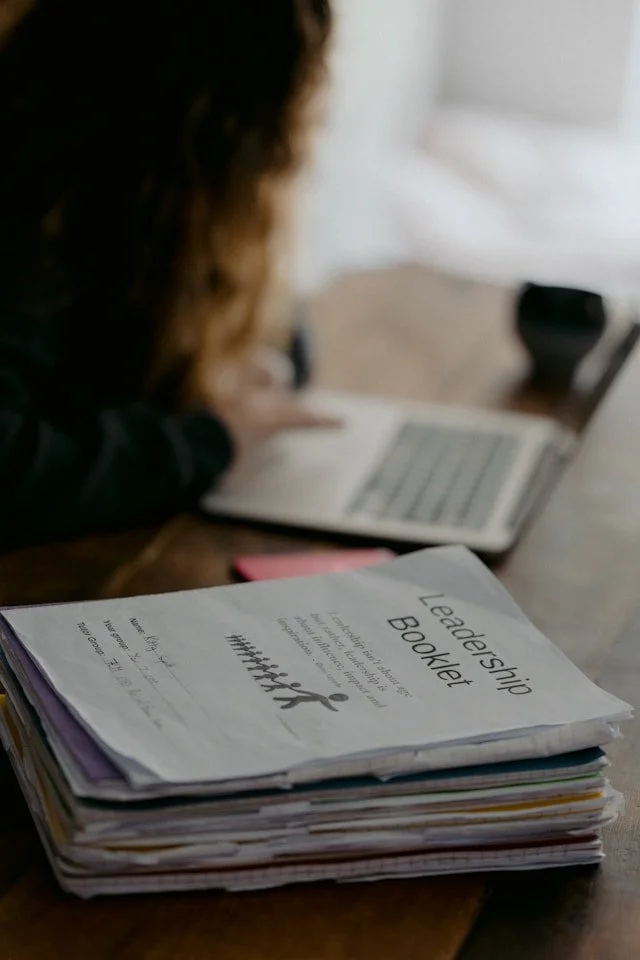The Ultimate Study Routine for High-Achieving Students
The Ultimate Study Routine for High-Achieving Students
High-achievers reflect, reset, and keep levelling up.
Everything you need for the semester you want!
This bundle includes:
The Syllabus Study Planner
The Pomodoro Planner
A Confidence Tracker
A Q&A planner
The “Get Organized Checklist”
and more!
This workbook is full of super useful resources that can be applied to every aspect of your day.
* Disclaimer * Some of the posted links are affiliate programs. By clicking these links, I may receive monetary compensation. This will not alter the price or change the buyer's experience.
High-achieving students aren’t just some mythical creatures who thrive on 4 hours of sleep and live for exam season. Although social media would love for you to believe that. Most of the time, they’re just regular people with one key difference: they have a system. A study routine that actually supports their goals, keeps them grounded, and helps them show up consistently, even when motivation is nowhere to be found.
TLDR? Listen here!
You don’t need to be naturally organized, superhumanly disciplined, or obsessed with school to succeed. You just need a routine that works with your brain, not against it.
In this post, I’m going to break down what makes a study routine truly effective and how you can build one that fits you specifically. This guide will walk you through a daily flow tailored to what makes you unique and makes academic success feel doable.
What Sets High-Achieving Students Apart
There is a common misconception that high achievers are just naturally smart or somehow wired differently. But in reality? It’s not about being the smartest person in the room. It's about how you show up.
Here’s what truly sets high achievers apart:
1. They focus on consistency over intensity
Instead of pulling the occasional all-nighter, they build steady, repeatable routines. Even short daily study sessions add up when done consistently. It’s not about studying more, it’s about studying smarter and showing up regularly.
2. They work with their energy, not against it.
Top students know when they’re most focused and plan their toughest work accordingly. They don’t try to power through burnout. They schedule breaks, get enough sleep, and protect their focus.
3. They plan strategically
They use planners, digital tools, or simple checklists to stay ahead of deadlines. They break tasks down, review often, and avoid cramming by making space for spaced repetition and active recall.
4. They reflect and adjust.
If something isn’t working, they don’t just try harder. They try differently. They’re not afraid to switch things up until they find exactly what works for them.
High achievers aren’t perfect. They just create systems that help them stay grounded and focused. And you can, too.
How Top Students Start Their Day for Maximum Productivity
How you start your day can shape the entire tone of it. High-achieving students know this. That doesn’t mean you need a 4 AM wake-up call, a 10-step smoothie ritual, or a full meditation session before sunrise. It just means your morning needs to serve you.
Here’s what a strong (and sustainable) morning routine can look like:
1. Wake-up time that works for you
Forget the “you have to wake up early to be productive” myth. What matters is consistency. Whether you’re up at 6 AM or 10 AM, create a wake-up time that gives you enough space to start the day without rushing.
2. Do a quick mental warm-up
Think of this like stretching before a workout. It could be:
Reviewing your to-do list or weekly goals
Skimming your notes or flashcards
Listening to a podcast or rewatching a short lecture
It doesn’t have to be intense, just something that activates your brain and sets the tone for a focused day.
3. Set your top priorities for the day
Top students don’t try to do everything. They focus on doing the right things. Choose 1–3 academic tasks that matter most and write them down somewhere visible. This keeps your goals in focus even when distractions try to creep in.
The best morning routine isn’t about what looks good on TikTok. It's about what helps you feel grounded, prepared, and ready to take on your day.
How to Structure an Effective Study Routine
This is where the magic happens. A high-achieving study routine isn’t about grinding for 8 hours straight. It's about intentional, focused work that strikes a balance between productivity and sustainability.
1. Time-block or use a hybrid method
High-achievers don’t just “hope” to find time to study. They make it. Try:
Time-blocking: Assign specific tasks to specific time slots
Pomodoro technique: 25 minutes of focus + 5-minute break (after 4 rounds, take a longer break)
Hybrid: Time-block your Pomodoros. It's a thing, and it’s powerful. This is my personal favourite method, and I have never regretted it.
This helps you stay focused, reduce procrastination, and protect your brain from burnout.
2. Prioritize deep work
Your most mentally demanding tasks, like writing essays, solving complex problems, or reviewing challenging concepts, should be done during your peak focus times. Save easier tasks (like organizing notes or rewatching lectures) for lower-energy study sessions.
3. Schedule review sessions
High achievers don’t just study once and hope for the best. They review material multiple times using spaced repetition and active recall to strengthen memory.
Tip: Schedule quick weekly reviews to reinforce older material while learning new content.
4. Mix it up to avoid burnout
Balance hard subjects with lighter ones. Also, alternate between reading, writing, and practice problems to keep your brain engaged without exhausting it.
At the heart of every great study routine is structure, but remember to have enough flexibility to adapt when life gets in the way.
Nighttime Study Habits That Support Brain Recovery and Memory Retention
What you do at the end of the day is just as important as how you start it. Top students use their evenings to lock in what they’ve learned, reflect on progress, and reset for tomorrow, without running themselves into the ground.
Here’s what a purposeful evening routine can look like:
1. Review what you learned
This doesn’t need to be a major study session. Just a quick 5–10 minutes to:
Summarize key points from the day
Quiz yourself on flashcards
Write one or two “takeaways” in your planner or notes
This light review strengthens retention while your brain is winding down and preparing to consolidate memories overnight.
2. Reflect + reset
Ask yourself:
What went well today?
What could I improve tomorrow?
Is there anything I need to prep for the morning?
A little self-check-in goes a long way when building long-term habits. Plus, it helps reduce that “I’m forgetting something” anxiety.
3. Prep your space (and your brain)
Lay out materials for the next day, plug in your devices, and unplug your mind. You can also start prepping for the following day. Create a cutoff time for studying so your brain gets the message: we’re done for today.
Bonus: Get off screens at least 30 minutes before bed. This significantly increases the quality of sleep. Your future well-rested self will thank you.
High achievers don’t just work hard. They also recover smart. Your brain needs time to process, rest, and recharge. Make space for that in your routine.
How to Do a Weekly Reset That Keeps You on Track
Even the best routines need regular tune-ups. High-achieving students don’t just plan and hope for the best. They review, reflect, and make smart adjustments every single week. This habit is what keeps their routine sustainable instead of overwhelming.
Here’s how to build your own weekly reset:
1. Review your wins and challenges
Take 5–10 minutes each weekend to ask:
What worked well this week?
What felt stressful or didn’t go as planned?
Did I meet my academic goals?
You don’t need a full journal entry. Just a quick mental or written check-in is enough to stay grounded.
2. Adjust your game plan
Based on your review, tweak your routine for the week ahead.
Need more time for a particular subject? Shift your blocks.
Feeling burned out? Plan shorter sessions or build in extra breaks.
Something new coming up? Rebalance your priorities.
Flexibility isn’t a weakness. It's a strength. Learning how to wield it as a tool will make all the difference in your motivation and success.
3. Set your weekly focus
Pick one academic or personal goal to center your week around. It might be finishing a paper, catching up on readings, or improving your focus. Having a single focus keeps your routine purposeful and aligned with your bigger goals.
A weekly reset keeps your momentum going without letting things pile up. It’s how high achievers stay ahead without burning out.
There’s no one-size-fits-all routine for success, but the best study routines have a few things in common: consistency, intention, flexibility, and a focus on what actually works. High achievers don’t have more hours in the day. They just use theirs with intention and purpose.
Whether you’re aiming for top grades, preparing for grad school, or just trying to feel more in control of your study life, building your own high-performance routine is completely within reach.
Remember: you don’t need to do everything. You just need to start with what works for you and build from there.
Ready to build your own high-achieving study system?
Join the Study Skills Digital Course and get access to the tools, templates, and time-tested strategies that help students succeed without burning out.
Study Skills Digital Course
Learn how to create a stress-free, comprehensive study strategy!
I would like to be transparent so that there are no misunderstandings. As an affiliate, I may earn a small commission from any products linked in this post. This is not a sponsored post, and I was not asked to recommend these products. These are products that I genuinely love and want to share with my audience.




